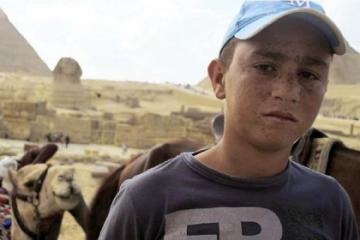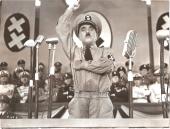'Back to the Square': human faces of Egyptian repression
Toussaint l'Ouverture leads a successful slave revolt against Napoleon, and Haiti becomes the world's first black democracy. Russia gets rid of Tsar Nicholas, and a utopian workers' paradise is established. Saddam Hussein is deposed, and the Iraqi mission is accomplished. Hosni Mubarak gets booted in the Arab Spring, and Egypt is free at last.
Not quite.
Great events that rivet world attention inevitably devolve into "old news." What's your attention span for C-Span? Once the excitement dies down, sooner rather than later, we reach for the remote to change channels. Two years after the euphoria of Tahrir Square, Egypt's revolution remains a problematic work in progress, with no less official repression than before. More than 12,000 people have been arrested, many of them tortured before being "convicted" by military tribunals.
Petr Lom's powerful documentary "Back to the Square" -- the final entry in this year's Carnegie Mellon University's International Film Festival -- starts with the revolution's euphoria and follows with the thwarting of its dreams: Portraits of five people who have suffered at the hands of the new -- not the old -- regime show how the systematic violence of the Mubarak era continues more or less unchanged.
Director Lom takes us first to Giza, home of 15-year-old Wally Hosni, a horse herdsman who plies the pyramids selling trinkets and rides to tourists. Typical of the 45 percent of illiterate Egyptians who live on less than $2 a day, the naive teenager is duped into riding horseback to Tahrir, where he is beaten by pro-Mubarak provocateurs. His story illustrates the plight of the poor, largely ignored by the international news media's coverage in favor of more photogenic texter-revolutionaries.
(Indeed, as a wry little prelude to the film demonstrates, one westernized Egyptian so reveres the social media's role in toppling Mr. Mubarak that he names his baby daughter "Facebook"!)
Mohamed Sayyd, by contrast, is a 47-year-old convict let out of prison with instructions to go to Tahrir Square and throw hydrochloric acid on protesters. He refused, was recaptured and tortured by police (showing us horrific burn marks all over his body) and now lives on the run -- AWOL from the reserve army of thugs used for public intimidation.
Two brave women are included: Lamiz Ragab, a 21-year-old student, is filmed outside an Egyptian police station, distraught that she had been arrested and bullied into testifying against her husband, now jailed on trumped-up drug charges. If her case illustrates the regular humiliation and mistreatment of women -- before, during and after Mubarak -- it's nothing compared to the fate of Salwa Hosseiny, arrested along with 20 other young women while protesting in Tahrir Square and forced to endure a public virginity examination. The Egyptian army justifies such outrages by claiming that many women democracy demonstrators are prostitutes. It's a terrible lie, but the charge sticks: Ms. Salwa can no longer return to her home village in the Nile Delta because she has "disgraced" it -- just by being accused, and even more by denying and refusing to stay silent about it.
The final portrait is of 19-year-old Mark Nabil, a computer-science student and brother of well-known blogger Maikel Nabil, who was sentenced to three years in prison for "insulting" the ruling military and posting videos of the army beating protesters in Tahrir Square. He is considered the first prisoner of conscience in post-Mubarak Egypt. (When the secret police showed up and filmed him, he responded by filming them in return on his cell phone, then posting the footage on YouTube in an extraordinary act of revolutionary courage.)
Director Lom, who has a doctorate in political philosophy from Harvard, traded an academic for a documentary-film career, focusing on human rights issues in Kyrgyzstan, China and, most notably, Iran ("Letters to the President" about the Ahmadinejad regime). His "pure" approach eschews background information or explication, which means his films require certain advance knowledge in order for the audience to grasp the layers of the situations. He doesn't cross-examine his subjects or verify their narratives. Do these five epitomize Egyptians, or are they anomalies?
I'm not sure. But "Back to the Square" is an important complement to the facile, celebratory reportage in the wake of Mr. Mubarak's demise. The military's stranglehold on dissent (and institutionalized terror) are evidently ongoing. It's crucial to document and honor the resistance to it. These five vibrantly real, sadly beautiful people are all different, all heartbroken and heartbreaking.
The "Facebook Revolution," far from finished, has only just begun.






